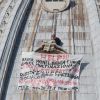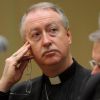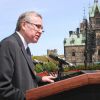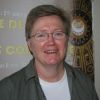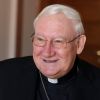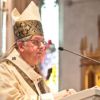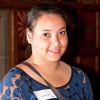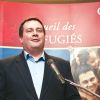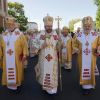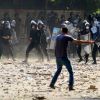VATICAN CITY - A 49-year-old Italian man protesting the economic policies of Italy and Europe scaled a fence on top of the dome of St. Peter's Basilica Oct. 2 and remained perched above a window for 28 hours, even during Pope Benedict XVI's weekly general audience in the square below.
With the help of two Vatican firefighters and the rope he had tied around himself, the protester, Marcello Di Finizio, climbed back up to the public walkway on top of the dome about 8 p.m. local time. He was escorted to a nearby Italian police station for what he told The Associated Press were "formalities."
Pope Benedict did not mention the protester, Marcello Di Finizio, during his audience talk.
Di Finizio, who had scaled the fence on the dome in July as well, runs a beachfront business in northern Italy, renting umbrellas and chaise lounges. He has been protesting Italy's plan to obey European Union directives by holding public auctions to distribute licenses to operate such businesses on public beaches.
Shortly after the Pope's general audience ended, Catholic News Service reached Di Finizio on his cellphone. Speaking from the dome, he told CNS: "I'm here to ask for help. Our government, our state, doesn't exist. Sectors of the economy, the beach sector, have been paralysed for years by government policies.
"I ask for political asylum from the Vatican," he said. "The Pope is the highest ethical and moral authority in this country, or at least he should be — let's hope he still is."
Di Finizio, who was wearing an Italian flag around his neck, said he would not come down until government officials and labour union officials promised to sit down with him and resolve the serious economic issues facing Italians who work in the tourism sector.
The protester said he felt forced to take his protest public in a highly visible fashion.
"I want to live; I like living," he said, but "if they want to kill me, let them do it in front of millions of people."
Di Finizio implied he could be willing to jump from the dome. When others are driven to such desperate measures, he said, "these are not suicides, these are homicides."
When a CNS reporter suggested that his message had been heard and he could come down, Di Finizio laughed and said: "In your country, maybe that would work, but we're in Italy. Here they will slap me on the back, kick me in the rear and not listen any more."
Then Di Finizio made a request, "Please ask the Pope to send up an electrical cable so that my phone battery doesn't go dead and I can keep talking to (all of) you."
Jesuit Father Federico Lombardi, Vatican spokesman, said Di Finizio obviously was not mentally stable.
Vatican firefighters and police officers remained on the public walkway around the top of St. Peter's dome throughout the night and into Oct. 3 as Di Finizio's protest continued.
Di Finizio had joined a group of tourists going to the top of St. Peter's Basilica at about 5 p.m. Rome time Oct. 2. Security cameras showed him climbing over the 1.5-metre-high fence, tying a rope around himself and lowering himself down to a large decorative overhang above one of the dome's windows. He also managed to unfurl and tie down a large banner to the dome that said "Help!" and called for an end to policies that were "butchering society."
TORONTO - On Sept. 29, the Feast of St. Michael, the University of St. Michael's College officially launched its Boundless Community fundraising campaign.
"Today the University of St. Michael's College, from our unique position with the University of Toronto, and together with the strong, steadfast loyalty of our alumni and friends, is announcing a historic never-before fundraising campaign," said Sr. Anne Anderson, president and vice-chancellor. "This campaign, unprecedented in scope and scale for St. Michael's, will seek to raise $50 million over the next five years."
And those in attendance heard that the campaign is already making great progress.
"I am delighted and proud to announce to you all today that we are already $24 million towards that vision," said Anderson. "This is an extraordinary accomplishment of which we are proud and grateful."
The funds will be used for a variety of improvements. Facilities will be digitally upgraded to modernize the school's academic environment while outdated furniture replacements, including in residence, will make studying more comfortable. The John M. Kelly Library, which has already received a rare collection of British author G.K. Chesterton's books, will broaden its range of material to meet the demands of 21st-century education.
Core funding is to be established for what Anderson called "hallmark College programs" — Book and Media Studies, Celtic Studies, Medieval Studies and Christianity and Culture — while the theology graduate program will also see further financial support.
Additionally, the SMC One — Cornerstone Program will be established with the money raised.
"Unlike no other first-year program at U of T today, Cornerstone will build character, enhance the pursuit of social justice and create a platform for greater dedication to community," Anderson told about 200 people attending the event. "We will reaffirm our Basilian founders commitment to goodness, discipline and knowledge for every first-year students."
Founded in 1852 as a Basilian college, the school has produced more than 50,000 alumni. This year alone the university has more than 4,800 undergraduate students and an additional 350 pursuing graduate degrees. That's more than 5,000 people who appreciate these fundraising efforts.
"On behalf of the Student Union, I would like to express my humble thanks and appreciation to all the volunteers and leaders in our community, men and women who model exemplary behaviour in their commitment to the academic mission of St. Michael's," said Mike Cowan, Student Union president.
"Their tireless work and generous philanthropy make this a better place for us all."
Additional and increased scholarships and bursary support will also be a result from this campaign.
Canadian Conference of Catholic Bishops plenary to examine updated guidelines on clerical sexual abuse
Ste. ADÈLE, Que. - At their annual plenary Sept. 24-28 the Canadian Conference of Catholic Bishops (CCCB) are examining the prevention of clerical sexual abuse as part of its packed five-day agenda.
The 90-plus bishops gathered from across Canada will receive the updated guidelines prepared for submission to the Congregation for the Doctrine of the Faith, conference president Archbishop Richard Smith said in his annual president’s address at the Mont-Gabriel Hotel here Sept. 23.
“Of course our ongoing response must extend far beyond the articulation of protocols and procedures to an embrace in love and compassion of any person, family or community affected by this scourge,” Smith said.
The reflections will also deal with the impact of the clerical sexual abuse crisis on the ministry of priests and how bishops can provide better support. It will also look at the conditions that increase the risk of sexual abuse with an eye to prevention, according to the CCCB program for the week, most of which is closed to visitors and news media.
“How do we foster healing? How do we ensure safe environments? What are the situations that could facilitate boundary violations?” Smith asked, stressing that those in ministry must provide an “unblemished” example.
For the first time, a federal cabinet minister will address the plenary assembly. The off-the-record discussion with Immigration Minister Jason Kenney arose out of suggestion by previous CCCB president Bishop Pierre Morissette that there be more conversation with government representatives, said Smith, now in his second year of a two-year term as president.
“Over the last few years particularly, a number of you have posed questions about Canadian immigration and refugee policies,” Smith said, noting the bishops “as pastors of the Church are to give particular care for refugees and others displaced because of violence and poverty.”
The relationship between Kenney and the bishops has been contentious in the past, with Kenney firing back at a letter from the CCCB’s justice and peace commission critical of anti-human smuggling legislation the commission feared risked harming refugees more than smugglers. Kenney accused the bishops of relying on bureaucrats who “cut-and-pasted” talking points from immigration advocacy groups.
The session with Kenney will also give bishops an opportunity to talk about the difficulties they have with bringing priests in from foreign countries to serve in their dioceses.
The bishops will also reflect on a pastoral response to the suffering caused by the economic downturn.
“We often hear it said that Canada has not been impacted as seriously as other countries,” Smith said. “While that may be true, nevertheless it is of cold comfort to the unemployed or those struggling to find affordable housing.”
Smith used a theme of unity to organize the many initiatives and programs of the CCCB over the past year, noting the mission of bishops is to serve the Church’s unity.
The CCCB adopted a national plan for life and family that is now underway, that is another sign of unity “in our witness to the beauty and sanctity of life,” he said, noting respect for life continues to erode in Western society.
“Every society needs the assurance its caregivers can be entrusted with the lives of its vulnerable members — those in the womb, children, the elderly, the handicapped and the infirm,” he said. “The grave crimes of abortion, euthanasia and assisted-suicide seriously undermine that trust. These are real threats not only to the individual but also to the common good.”
The bishops are summoned to find ways to “reinforce the central ideals of Christian family life, and to celebrate the love and nurturing that many families today achieve despite difficulties,” he said. Smith said the CCCB would be calling on diocesan life and family offices as well as the Catholic Organization for Life and Family (COLF) for help in this endeavour.
The meetings on the Canadian Catholic Organization for Development and Peace have an hour dedicated to reports by the bishops on the agency's board and from the Standing Committee for Development and Peace.
Pope names record number of women, including Canadian, to Synod on Evangelization
VATICAN CITY - Choosing men and women from every part of the world and from a wide variety of professions, Pope Benedict XVI nominated 45 experts and 49 observers for the upcoming world Synod of Bishops.
The Oct. 7-28 gathering will include the largest bloc of women — 10 experts, including Sr. Gill Goulding of Toronto's Regis College, and 19 observers — ever to participate in a Vatican synod.
Europe accounts for the overwhelming majority of the appointees, followed by North America, with 10 people from the United States, two from Mexico and Goulding from Canada. A number of the appointees are also advisors to the Pontifical Council for Promoting New Evangelization and other Vatican offices.
The list of papal appointments to the synod was published Sept. 22 by the Vatican.
Experts and observers, who include laypeople, are not voting members of the synod. According to Vatican rules, only priests, bishops and cardinals can be full members who vote and determine the propositions to be presented to the Pope at the end of the gathering.
The 45 experts include priests, nuns and laypeople, many of whom are professors, rectors or supervisors of catechetical or pastoral programs. They will serve as resources for the more than 200 synod members as they discuss the theme, "New Evangelization for the Transmission of the Christian Faith."
The 49 observers can attend all synod sessions, participate in the synod working groups and have an opportunity to address the entire assembly.
Many of the observers are leaders of religious orders, founders or leaders of lay movements or large Catholic associations, or professors or organizers of catechetical and pastoral programs.
Here is the full list of experts invited to attend the upcoming world Synod of Bishops:
- Sr. Gill Goulding C.J., associate professor of systematic theology and spirituality at Regis College University of Toronto (Canada).
- Sr. Beatriz Acosta Mesa O.D.N. (Colombia), superior general of the Company of Our Lady Mary.
- Mauro Agosto, professor of Latin at Rome's Pontifical Lateran University.- Fr. Anthony Alaba Akinwale O.P., rector of the Dominican Institute of Ibadan (Nigeria).
- Fr. Luiz Alves de Lima S.D.B., member of the administrative office of the Society of Latin American Catechists (Brazil).- Fr. Antonio Aranda Lomena, professor of dogmatic theology at the University of Navarre (Spain).
- Fr. George Augustin S.A.C., professor of fundamental and dogmatic at the "Philosophisch-Theologischen Hochschule Vallendar" (Germany).- Fr. Paul Bere S.J., professor of the Old Testament and biblical languages at the Catholic University of West Africa (Burkina Faso).
- Br. Enzo Bianchi, prior of the monastic community of Bose (Italy).- Br. Enzo Biemmi F.S.F., president of the European Team of Catechists (Italy).
- Fr. Luca Bressan, episcopal vicar for culture, charity, the mission and social work of the archdiocese of Milan (Italy).- Sr. Sara Butler M.S.B.T. (U.S.A.), professor at the Ecclesiastical Faculty of St. Mary of the Lake University in Mundelein, and member of the International Theological Commission.
- Jessica Joy Candelario, coordinator for the pastoral care of young people at "Bukal Ng Tipan Pastoral Centre" (Philippines).- Anna Kai-Yung Chan, professor at the Holy Spirit Seminary College of Theology and Philosophy, Hong Kong (China).
- Sr. Luisa Ciupa S.A.M.I., vice president of the Commission for Catechesis of the Greek-Catholic Ukrainain Church (Ukraine).- Fr. Eamonn Conway, head of the Theology and Religious Studies Department at Mary Immaculate College of the University of Limerick (Ireland).
- Fr. Jeremy Driscoll O.S.B. (U.S.A.), professor at the Theological Faculty of Rome's St. Anselm Pontifical Athenaeum, and professor of liturgy at the Mount Angel Seminary in St. Benedict, Oregon.- Caroline Farey, professor at the Maryvale Institute, Birmingham (England).
- Fr. Juan Javier Flores Arcas O.S.B. (Spain), rector of Rome's St. Anselm Pontifical Athenaeum.
- Msgr. Rafiq Hanna Khoury, professor of liturgy at the major seminary of Beit Jala (Palestinian Territories).- Sr. Anna Emmanuela Klich O.S.U., director of the Inter-Congregational Institute for Catechesis in Krakow (Poland).
- Fr. Jaime Alberto Mancera Casas, episcopal vicar for pastoral care in the archdiocese of Bogota (Colombia).- Msgr. Ermenegildo Manicardi, rector of Rome's "Almo Collegio Capranica", and professor at the Pontifical Biblical Institute (Italy).
- Fr. Thomas Manjaly, professor of Sacred Scripture at Oriens Theological College and at the Inter-Diocesan Theologate for North East India in Shillong (India).- Ralph Martin, director of graduate theological programs in the new evangelisation at the Sacred Heart Seminary of Detroit (U.S.A.).
- Fr. Paolo Martinelli O.F.M. Cap. (Italy), president of the Franciscan Institute of Spirituality at the "Antonianum" Pontifical Athenaeum in Rome, and professor of fundamental theology at the Pontifical Gregorian University in Rome.- Fr. Krzysztof Mielnicki, director of the office for catechesis of the diocese of Drohiczyn (Poland).
- Sr. Paula Jean Miller F.S.E., professor at the Department of Theology of the University of St. Thomas in Huston (U.S.A.).- Fr. Joseph-Marie Ndi-Okalla, vice rector of the "Universite Catholique D'Afrique Centrale" in Yaounde (Cameroon).
- Fr. Godfrey Igwebuike Onah (Nigeria), vice rector of the Pontifical Urban University in Rome.- Rodolfo Papa, professor of art history and aesthetics at the Pontifical Urban University in Rome.
- Fr. Cleto Pavanetto S.D.B., professor emeritus of the Faculty of Christian and Classical Literature at the Pontifical Salesian University of Rome.- Edward Peters, professor of canon law and holder of the Edmund Cardinal Szoka Chair at the Sacred Heart Major Seminary of Detroit (U.S.A.).
- Fr. Salvador Pie-Ninot (Spain), professor of fundamental theology and ecclesiology at the "Facoltat de Teologia de Catalunya", and professor of fundamental theology at the Pontifical Gregorian University in Rome.- Msgr. Antonio Pitta, professor at the Faculty of Theology of Rome's Pontifical Lateran University.
- Sr. Enrica Rosanna F.M.A, former under secretary of the Congregation for Institutes of Consecrated Life and Societies of Apostolic Life (Italy).- Fr. Marko Ivan Rupnik S.J. (Slovenia), director of the "Ezio Aletti" Study Centre in Rome.
- Fr. Samir Khalil Samir S.J. (Lebanon), professor of Arab-Christian theology at the Pontifical Oriental Institute in Rome, and professor of the history of Arabic culture and Islamology at the University of "St. Joseph de Beyrouth".- Fr. Kinkupu Leonard Santedi, professor at the Catholic University of Congo, president of the "Evangelii Nuntiandi" Foundation in Africa, and member of the International Theological Commission (Democratic Republic of Congo).
- Msgr. Pierangelo Sequeri (Italy), president of the Faculty of Theology of Northern Italy, and member of the International Theological Commission.- Thomas Soding, professor of biblical theology at the "Bergische" University of Wuppertal (Germany).
- Fr. Virginio Spicacci S.J., active in pastoral care and evangelisation in the archdiocese of Naples (Italy).- Fr. Mihaly Szentmártoni S.J. (Serbia), president of the Institute of Spirituality of the Pontifical Gregorian University in Rome.
- Fr. Giuseppe Tanzella-Nitti, professor of fundamental theology at the Pontifical University of the Holy Cross in Rome.- Petroc Willey, dean of graduate research at the Maryvale Institute of Birmingham (England).
The Secretary General of the Synod of Bishops has, likewise with the approval of the Supreme Pontiff, appointed the following individuals as "Auditores" (or Auditros) for the forthcoming Synodal Assembly.
- Emile Amin Henein, Director of the "Truth" Centre for Political and Strategic Studies, (Egypt).
- Chiara Amirante, founder and president of the New Horizons Community (Italy).- Carl Albert Anderson (U.S.A.), supreme knight of the Knights of Columbus.
- Fr. Camilo Bernal Hadad C.I.M. (Colombia), superior general of the Congregation of Jesus and Mary.- Sr. Maria Antonieta Bruscato F.S.P. (Brazil), superior general of the Daughters of St. Paul.
- Guzman Carriquiry (Uruguay), secretary of the Pontifical Commission for Latin America.- Jose Maria Simon Castellví (Spain), president of the International Federation of the Association of Catholic Media F.I.A.M.C.
- Sr. Rekha (Mary Joseph) Chennattu R.A., professor of the New Testament at the Pontifical Institute of Philosophy and Religion in Pune (India).- Fr. Renato de Guzman S.D.B., chief assistant for pastoral care of the Grade School and High School Departments, Don Bosco Technical Institute in Makati City (Philippines).
- Florence De Leyritz, member of the Alpha France Association (France).- Marc De Leyritz, president of the Alpha France Association (France).
- Fr. Ari Luis do Valle Ribeiro, professor at the seminar of the diocese of Santo Amaro, and diocesan coordinator for catechesis (Brazil).- Mikhail Fateev, director of production at the "United Television" channel of St. Petersburg (Russian Federation).
- Sr. Inmaculada Fukasawa A.C.I. (Japan), superior general of the Handmaidens of the Sacred Heart of Jesus- Msgr. Enrique Glennie Graue, vicar general of the archdiocese of Mexico (Mexico).
- Francisco Jose Gomez Arguello Wirtz (Spain), co-founder of the Neo-Catechumenal Way.- Fr. Jesus Higueras Esteban, pastor of S. Maria de Cana, Madrid (Spain).
- Marco Impagliazzo (Italy), president of the Sant'Egidio Community.- Lydia Jimenez Gonzalez (Spain), director general of the "Cruzadas de Santa Maria" Secular Institute.
- Ernestine Sikujua Kinyabuuma, professor at the University Institute of Maria Malkia in Lubumbashi, and member of the "Focolari" Movement (Democratic Republic of Congo).- Joakim Kipyego Koech, head of the Communion and Liberation Movement in Kenya.
- Zoltan Kunszabo, permanent deacon of the archdiocese of Esztergom-Budapest (Hungary).- Ewa Kusz (Poland), former president of the World Conference of Secular Institutes, C.M.I.S.
- Chantal Le Ricque, lay woman of the archdiocese of Paris (France).- Fr. Vinko Mamic O.C.D., president of the Union of Superiors Major in Croatia (Croatia).
- Curtis A. Martin, founder and president of the Fellowship of Catholic University Students - Focus (U.S.A.).- Salvatore Martinez, president for Italy of the Renewal in the Holy Spirit Movement (Italy).
- Sr. Nzenzili Lucie Mboma F.M.M. (Democratic Republic of Congo), executive director of the Service of Documentation and Study on Global Mission, S.E.D.O.S.- Marylee J. Meehan (U.S.A.), president of the International Catholic Committee of Nurses and Medico-Social Assistants, C.I.C.I.A.M.S.
- Franco Miano, president of Italian Catholic Action.- Gisele Muchati, regional director of the New Families Movement (Syria).
- Peter Murphy, executive director of the Secretariat for Evangelisation and Catechesis of the United States Conference of Catholic Bishops (U.S.A.).- Patricia Ngozi Nwachukwu K.S.M., member of the Knights of St. Mulumba (Nigeria).
- Yong Suk Francis Xavier Oh, secretary general of the Catholic Lay Apostolate Council of Korea (Korea).- Fr. Piergiorgio Perini, president of the International Service Organisation for the "Cellule Parrocchiali di Evangelizzazione" (Italy).
- Rita María Petrirena Hernandez, head of the department for pastoral coordination of the Conference of Catholic Bishops of Cuba (Cuba).- Sr. Suzanne Louise Phillips F.M.M. (Australia), superior general of the Franciscan Missionary Sisters of Mary.
- Sr. Mary Prema Pierick M.C. (India), superior general of the Missionaries of Charity.- Jose Prado Flores, founder and international director of the St. Andrew Schools of Evangelisation (Mexico).
- Sr. Yvonne Reungoat F.M.A. (France), superior general of the Daughters of Mary Help of Christians, Salesian Sisters of St John Bosco. - Br. Alvaro Antonio Rodriguez Echeverria F.S.C. (Costa Rica), superior general of the Brothers of Christian Schools.
- Michel Roy (France), secretary general of "Caritas Internationalis".- Raid Sargi, president of the Society of St. Vincent de Paul in Damascus (Syria).
- Tommaso Spinelli, catechist of the youth group of the parish of Santa Melania Juniore in Rome.- Manoj Sunny, director and journalist, founding member of the Jesus Youth Movement (India).
- Br. Emili Turu Rofes F.M.S. (Spain), superior general of the Marist Brothers (Little Brothers of Mary).- Fr. Emmanuel Typamm C.M. (Cameroon), secretary general of the "Confederation des Conferences des Superieurs Majeurs D'Afrique et de Madagascar", Co.S.M.A.M.
- Maria Voce (Italy), president of the Focolari Movement.- Sr. Mary Lou Wirtz F.C.J.M. (U.S.A.), president of the International Union of Superiors General, U.I.S.G.
OTTAWA - To a nearly empty House of Commons Sept. 21, Conservative MP Stephen Woodworth made a final impassioned final plea for an “open-minded, evidence-based study” of the 400-year-old Criminal Code definition of a human being.
He spoke last, after MPs on both sides of the House spoke against or in favour of his private member’s Motion 312 that would establish a parliamentary committee to examine the Criminal Code’s subsection 223(1) that says a child is not a human being until the moment of complete birth. Opposition MPs argued the Motion represented a “backdoor” to re-criminalizing abortion and violating a woman’s right to control her own body.
But Woodworth disagreed.
“About abortion, I say this: recognizing children as human before the moment of complete birth will not resolve that issue,” Woodworth said.
“Even Justice Bertha Wilson, who championed abortion rights in the Morgentaler decision, wrote that Parliament should ‘inform itself from the relevant disciplines’, the very proposal embodied in Motion No. 312.
“Recognizing the reality that children are human beings before complete birth will affirm the hallowed principle that human rights are universal, not a gift of the state that can be cancelled by subsection 223(1),” he said.
Only between 30 and 35 MPs attended the final hour of the House of Commons' agenda dealing with private member’s business on a rainy and gloomy Friday afternoon, with members coming and going.
But the diplomat’s gallery was surprisingly full with several members of the pro-life movement present, including Linda Gibbons, a grandmother who has spent a total of nine years in prison for silently praying outside abortion clinics in Toronto.
The government’s chief whip, MP Gordon O’Connor, sat in the House as if taking careful note of Conservative MPs who rose to speak in favour of the Motion. O’Connor had told the House in the previous hour of debate the government would not support this motion or allow the abortion debate to be reopened.
Though he did not speak in the second hour, his presence in the nearly empty chamber spoke volumes. At one point, he crossed the aisle and sat for several minutes at the same desk as NDP justice critic Francoise Boivin, a vociferous opponent of Motion 312. Boivin had been singing O’Connor’s praises in the previous week for arguing as she has that the motion is an attempt to recriminalize abortion.
Minister of State of Foreign Affairs Diane Ablonczy also sat in the House, though from her body language — head down, poring over reading material, seemed to indicate she was disengaged from the debate around her. While traditionally private members’ business is a free vote for MPs, many are watching to see what publicly identified pro-life cabinet ministers will do when Motion 312 comes to a vote and whether they will break with the government’s stated opposition to the ban.
The Parliamentary Secretary to the Natural Resources Minister MP David Anderson was the highest-ranking Conservative to risk the prime minister’s ire by speaking in favour of the motion. He opened by saying he had received 200 e-mails urging his support the previous evening alone.
“I have had over 1,500 responses encouraging me to support Motion No. 312,” he said. “I find it interesting that many of them have come from young women. I think that is a rebuke to the opposition members, reminding them that there are young women in this country who believe in what is being proposed in today's motion.
“We need to recognize that a majority of Canadians believe that human life begins long before a person is born. We can understand that if the evidence establishes that a child does in fact become a human being before the moment of complete birth, then subsection 223(1) has some major problems and it is actually a law that dehumanizes and excludes a whole class of human beings from legal protection.”
“The member for Kitchener Centre's desire to open up this debate has an end goal of changing the legislation to enable the fetus to be declared a human being,” argued NDP MP Irene Mathyssen. “We are all very aware that such a change in the definition will place Canada directly on the regressive path to banning abortions.
“A fertilized egg is not a class of people, and I am offended that the member would shamelessly misrepresent the women's rights movement as an example of why we should open the door to changing abortion rights in Canada,” she said.
NDP MP Sylvain Chicoine told the House “the debate is closed in the minds of Canadians.”
He said Woodworth was either “contradicting himself” or “hiding his real desire to turn women who have abortions into criminals.”
When the debate ended, the new Deputy Speaker NDP MP Joe Comartin asked for a voice vote on the motion. The “nays” were far louder than the “yeas” to the CCN journalist sitting in the gallery. Comartin called it a second time and still the nays were louder. But there were more “yea” voters sitting in the House.
“In my opinion the yeas have it,” he said. However, at least five MPs stood up, meaning a final vote will be held Sept. 26.
OTTAWA - An Ottawa conference Sept. 27-29 marking the 50th anniversary of the Second Vatican Council will examine how to “hand on the
Gospel today” in light of Vatican II’s teachings, said Saint Paul University theology professor Catherine Clifford.
“One of goals is to promote the pastoral renewal of the Church,” said Clifford, an organizer of the Vatican II: For the Next Generation Conference. Co-sponsored by Saint Paul’s Vatican II and 21st Century Catholicism Research Centre and Novalis, the conference will begin a week before bishops from around the world gather in Rome for the Synod on the New Evangelization.
“The world we live in today is very different from the world 50 years ago,” Clifford said. “Many of the questions are not the same questions the bishops were reflecting on in 1962-65 in the Council.”
When Vatican II opened 50 years ago, it took place against the backdrop of the Cold War, less than 20 years after the end of the Second World War, said Clifford. Since then there has been a marked shift to the global integration of societies and culture, she said.
“It’s an era of an unprecedented migration of peoples,” she said. “The population of the world has more than doubled; the population of the Catholic Church has more than doubled.
“The majority of Catholics live not in Europe and North America but in the Southern hemisphere. We are a very different Church than we were 50 years ago.”
Though poverty and social injustice remain challenges, “in some ways those issues are far more complex than they were 50 years ago,” she said.
Another sign is the growing recognition of the dignity of the human person that is probably even stronger than it was 50 years ago, when the civil rights movement in the United States was gaining momentum, she said.
The conference will feature a keynote address by Cardinal Peter Turkson, president of the Pontifical Council for Justice and Peace and one of the names that frequently appears in speculation about future popes. The cardinal will speak on “Vatican II: A Council of Justice and Peace.” He will also receive an honorary doctorate at a special convocation in the university chapel on Sept. 28.
Other conference attendees include dogmatic theology professor Christoph Theobold, S.J., from the Centre Sèvres in Paris, France, and Boston College systematic theology professor Richard Gaillardetz. The conference will feature a panel of bishops and advisors who participated in the Council, including Bishop Remi De Roo and Bishop Gerard J. Deschamps, and advisors Gregory Baum and Leo Laberge, omi.
See www.ustpaul.ca or e-mail vaticancentre@ustpaul.ca.
Canadian bishops’ plenary Sept. 24-28 marks historic events
OTTAWA - The Canadian Conference of Catholic Bishops’ (CCCB) annual plenary Sept. 24-28 in Ste. Adele, Que., will mark many firsts this year, from distinguished guests to reflections on topics as diverse as the Second Vatican Council and the worldwide economic crisis.
The gathering, which is expected to draw 80 bishops from across Canada, comes on the eve of several historic events that will also be addressed: the 50th anniversary of the opening of the Second Vatican Council Oct. 11, the Synod of Bishops on New Evangelization Oct. 7-28 in Rome and the canonization of Kateri Tekakwitha on Oct. 21.
“(The plenary) is always such an important moment in the life of the Canadian Church,” said CCCB general secretary Msgr. Patrick Powers. The CCCB executive and secretariat staff “always look forward to the many, many things that will be decided upon in the course of that meeting.”
Among the highlights of this year’s agenda is the visit of Ukrainian Major Archbishop Sviatoslav Shevchuk who will offer a reflection Sept. 25 after having presided at the worldwide Ukrainian Catholic Church Synod of Bishops in Winnipeg Sept. 9-16. He has made pastoral visits to various cities in Canada over recent months to mark the 100th anniversary of the arrival of the first Ukrainian Catholic Bishop Nyktyta Budka to Canada.
Msgr. Jeffrey Steenson, the new Ordinary for the United States’ Personal Ordinariate of the Chair of St. Peter, will also attend. The Ordinariate was erected in January to provide a home for people from the Anglican tradition who wish to become Catholic while maintaining aspects of Anglican liturgy and patrimony under the Holy Father’s 2008 Apostolic Constitution Anglicanorum coetibus. Toronto Cardinal Thomas Collins, the episcopal delegate for Anglicanorum coetibus in Canada will give a report on progress, Powers said.
Immigration Minister Jason Kenney will also hold an off-the-record discussion with the bishops. Powers said it will be a “give and take” session on a range of concerns, from recent legislation that impacts refugees, to the parish refugee sponsorship programs. Many dioceses have a significant number of foreign priests, Powers said, “so (Kenney) is well-placed to help the bishops understand the various things that are happening.”
The canonization of Kateri Tekakwitha gets prominent billing. Saint-Jean-Longueil Bishop Lionel Gendron, the CCCB co-treasurer who heads a temporary secretariat to co-ordinate events in Canada and in Rome surrounding the canonization, will make a presentation on this significant event to the Church and to native Catholics.
To mark the 50th anniversary of the Second Vatican Council, Laval University theologian Gilles Routhier, who is an expert on the Canadian contribution to Vatican II, will deliver a talk.
The Canadian bishops elected last year as delegates at the Synod on New Evangelization will inform the plenary of the content of their Synod interventions, Powers said.
The bishops will also hold a discussion on the upcoming Year of Faith instituted by Pope Benedict XVI.
The bishops will also hold a dinner for Montreal Cardinal Jean-Claude Turcotte who retired this year as archbishop of Montreal, and Collins, who received his cardinal's red hat last February.
The bishops also have a packed agenda of presentations and reports that happen every year, such as reports from organizations like the Canadian Catholic Organization for Development and Peace, the Canadian Aboriginal Council, the Catholic Organization for Life and Family and other groups. The episcopal commissions will report as will standing committees, such as communications and Development and Peace. The bishops will address fiscal matters and adopt a new budget.
Development and Peace fall campaign is put on hold
The traditional fall education campaign of the Canadian Catholic Organization for Development and Peace is on hold until Oct. 15 while staff and volunteers scramble to come up with less political material that will gain the backing of all of Canada's bishops.
Canadian Conference of Catholic Bishops president Archbishop Richard Smith and general secretary Msgr. Pat Powers informed Development and Peace Sept. 5 that several bishops had objected to the fall campaign and did not want the material distributed in their diocese. It is the first time in the 45-year history of the Catholic development agency that the bishops have intervened to block an education campaign.
Neither the CCCB nor Development and Peace could tell The Catholic Register how many bishops have objected to campaign materials, which have been printed but not yet distributed. Through a spokesperson, Smith declined to be interviewed for this story as "the bishops have not had a chance to discuss the issue."
Bishops on the CCCB's Standing Committee on Development and Peace were not consulted on the move to halt the campaign and have not seen the materials.
"I haven't had it explained to me, so I can't really comment," said Toronto's Bishop John Boissonneau, chair of the committee. "I was aware that the president of the conference sent out a letter, but there's been no follow-up with me directly."
"I kind of feel out in the cold on this," said committee member Bishop Richard Grecco of Charlottetown.
The last time the bishops' committee met was May 31 for a consultation with the Development and Peace liaison committee for relations with the bishops. Meanwhile, work on the fall education campaign had been delayed until June while the organization dealt with major restructuring to accommodate a drastic cut in Canadian International Development Agency funding.
The fall campaign was to have veered off-course from Development and Peace's five-year plan of environmentally themed education campaigns. This campaign, which included postcards addressed to Prime Minister Stephen Harper, was conceived as a national consultation on the direction of Canada's foreign aid policy.
A copy of a Development and Peace postcard addressed to Harper was obtained by The Catholic Register. It asks Harper to "launch a national consultation on the future of Canadian development assistance." The card also urges a "Special Parliamentary Committee to examine the new direction of Canadian assistance."
"The trend in how Canada's foreign aid programs are administered has changed quite dramatically," Development and Peace executive director Michael Casey told The Catholic Register. "The role for civil society organizations like us is becoming less apparent. More of the money is going to multilateral institutions, private sector development.... We wanted to see if a constructive critique of this policy from our perspective could get a hearing."
The campaign did not mention the $35-million cut over five years in CIDA funding to Development and Peace, said Casey, and is not an attempt to revisit the funding decision, he said.
"Concerns were expressed regarding the nature and methodology of the campaign with respect that it could create some divisiveness within the Church community and that perhaps there should be some more consultations within D&P and also with the broader Church," said Ronald Breau, Development and Peace national council president.

Archbishop Smith
- Register file photo
Breau wrote to the Development and Peace membership Sept. 17 to explain the delay.
"We are fully aware that our decision will disappoint many of our active and engaged members," Breau wrote.
While the campaign will be modified, the fall action campaign will remain focussed on Canada's development aid policies. But the national council is heeding Smith's warning that the original campaign would "lead to division among our base, among bishops and among our supporters," Breau wrote.
"The bishops are concerned that ongoing dialogue between the Catholic Church and the Government of Canada on some important, timely and sensitive issues might be compromised by our approach at this time."
Parish Development and Peace leader Greg Kennedy is left wondering what his group will do while it waits for the campaign to launch.
"Traditionally Development and Peace at the parish level operates basically two times a year — one in the fall with the education campaign and then the Share Lent or ShareLife in (the Toronto archdiocese)," said the Jesuit, who is studying for the priesthood and helping out at Our Lady of Lourdes in downtown Toronto. "Without those bookends, really there's not much to do until Lent."
The appearance that the bishops are divided or opposed to Development and Peace has become a challenge for parish groups, said Kennedy. And the idea that the bishops' conference did not inform its own standing committee will be even more confusing.
"The bishops set up these avenues through which both they and Development and Peace would work and all of a sudden that gets over-ridden. That's disturbing," he said. "What's the point of having them if they're not going to be used."
But lobbying the government on policy does not amount to education, said Grecco.
"We can have that dialogue (on Canadian development policy). I just don't think it should be a campaign. That's not what D&P should be about."
Vatican synod to examine when divided Christians can preach together
VATICAN CITY - The potential power, but also the limits, of an ecumenical proclamation of the Gospel and defense of Gospel values is likely to be a key topic during October's world Synod of Bishops on the new evangelization.
The ecumenical focus will be particularly sharp Oct. 10 when — at the personal invitation of Pope Benedict XVI — Anglican Archbishop Rowan Williams of Canterbury will deliver a major address to synod members.
While popes have long invited other Christians to be "fraternal delegates" and make brief speeches at the synods, Pope Benedict has begun a tradition of inviting important religious leaders to deliver a major address. In 2008, Orthodox Ecumenical Patriarch Bartholomew of Constantinople and Chief Rabbi Shear-Yashuv Cohen of Haifa, Israel, addressed the Synod of Bishops on the Bible. Another rabbi and two Muslim leaders gave speeches at the 2010 special synod on the Middle East.
Bishop Brian Farrell, secretary of the Pontifical Council for Promoting Christian Unity, said the invitations demonstrate the Pope's recognition that the "challenges facing religious belief itself and Church life are common — no Church, no religion is an island — and we need one another and can learn from one another."
In addition, he said, ecumenical and interreligious co-operation shows the world that "we are together in promoting the values of belief and the moral-ethical values that we stand by."
Ecumenical co-operation is crucial when trying to transmit the faith in the modern world and to re-propose Christianity in areas, especially Europe and North America, which had a Christian tradition, but are becoming increasingly secularized.
"The mission that the Lord entrusted to the Apostles, to preach the Gospel to the ends of the Earth, has not been fulfilled — mostly because of divisions among His followers," Farrell said.
The beginnings of the modern ecumenical movement usually are traced to a 1910 conference of missionaries "who had the experience of being seen as preaching against each other instead of preaching Christ," he said. The missionaries recognized the scandal they were causing as they "exported their divisions" to Asia, Africa and other parts of the world.
The missionaries saw "their work being undermined by their own divisions," which they increasingly acknowledged were violations of the will of Jesus that His followers be one, the bishop said.
Meanwhile, among some Catholics in the early 1900s, "there were the beginnings of a spiritual interest in the idea of prayer for Christian unity," he said, but the quantum leap in the Catholic Church's commitment to ecumenism came with the 1962-65 Second Vatican Council.
Farrell said the change in the Church's attitude reflected an "education of the bishops at the council, because most of the bishops came with the kind of theology that considered our Protestant brothers and sisters, and the Orthodox to a certain degree, as just outside the Church."
Through discussions and studies at the council, he said, the bishops gained "a new perspective: We have a common faith in Jesus Christ, we have a common baptism, and this is already a huge element of real communion in the faith."
The ecumenical task, embraced by the Catholic Church, involves prayer and dialogue to move that communion "from imperfect to perfect," he said. Until the process is complete, however, there will be some limits to the possibilities for ecumenical co-operation in evangelization, because Catholics, Orthodox, Anglicans and other mainline Christians aren't just inviting people to profess faith in Jesus Christ, but to live that faith in His body, the Church.
"There is a kind of superficial ecumenism that says, 'it doesn't matter what Church you belong to,'" Farrell said, but the Catholic Church and most of its dialogue partners reject that view.
Because Christians aren't passing on "some Gospel of their own making," but a faith they have received, "sharing one's faith means sharing one's belonging to a particular community that has given me that faith. It means sharing the conviction, in conscience, that the Gospel comes to me in its fullness in this particular community," the bishop said.
The role of the Church and, in fact, the definition of what it means to be fully Church is at the heart of the ongoing, sometimes difficult, theological ecumenical dialogues, he said.
For the Catholic Church, Farrell said, "We can't work for a common minimum denominator; nor can we say, 'let's keep our differences and just accept one another as we are.'
"We have to aim at whatever is required for the fullness of incorporation into Christ and into the one Church He founded. But where is that Church? That is the question that will trouble us until Christian disunity becomes Christian unity: not uniformity, but true, grace-filled communion in faith and Christian living."
Cardinal Collins to open Year of Faith in Toronto
TORONTO - From your library to the confessional, from relics to rejoicing, the archdiocese of Toronto has lined up a year’s worth of ways to rediscover faith.
The Year of Faith kicks off inter- nationally on Oct. 11, commemorating the 50th anniversary of the opening of the Second Vatican Council. In Toronto, the year will start with a solemn opening Mass with Cardinal Thomas Collins at St. Paul’s Basilica on Oct. 14. All 223 parishes in the archdiocese are being encouraged to send representatives, particularly their RCIA catechists, youth leaders and parish council members, to the 4 p.m. Mass at the downtown basilica.
Collins will also dedicate this year of lectio divina programs to a biblical understanding of faith.
The Office of Formation for Discipleship wants to add the Catechism of the Catholic Church to your reading list. And they hope to introduce young people to the Compendium of the Social Doctrine of the Church and the YouCat youth catechism produced for World Youth Day in Madrid in 2011.
“Exploring the Catechism: Faith Alive!” is an eight-part series, and the catechism-based six-part series “Basic Teachings of the Catholic Church” will be promoted in parishes by the Office of Formation for Discipleship. A Fr. Robert Barron 10-part video series called Catholicism will also be available.
The Office of Catholic Youth will run catechetical events based on the Compendium of the Social Doctrine of the Church and YouCat.
A chance to visit with martyrs and saints will be coming to many parishes. Relics of 17th-century Jesuit martyrs from the Martyrs’ Shrine in Midland, Ont., and of St. Br. André Bessette from St. Joseph’s Oratory in Montreal, will tour the archdiocese.
On Oct. 21 seven blesseds will become saints, including Blessed Kateri Tekakwitha, the Lily of the Mohawks. The canonizations will happen in Rome. Parishes are being encouraged to organize events to celebrate Canada’s first aboriginal saint.
Penance will lead local Catholics to faith with the all-day confessions event called “Return to Me With All Your Heart.” The program will be offered in many parishes during Lent.
“The renewal of the Church is also achieved through the witness offered by the lives of believers,” Pope Benedict XVI wrote in his October 2011 announcement of the Year of Faith, Porta Fidei. “By their very existence in the world, Christians are called to radiate the word of truth that the Lord Jesus has left us.”
CCAS funds dreams and ambitions for former foster kids
TORONTO - When 21-year-old Tia McGregor sees the younger kids who like her have grown up in foster homes — kids who have to figure out life without a family to support them the day they turn 18 — she tells them to follow their highest ambitions and their most cherished dreams.
"Do what you love and the rest will follow," she says.
The fourth-year Queen's University drama student knows her message is pretty hard to take seriously when you're 18 and have just been kicked out of your foster home.
"It didn't help me when people told me," she said. "For youth in care, there is so much more you have to think about."
Most former foster kids think they can't afford ideals, dreams and ambitions, said McGregor. They've got to worry about the rent, groceries, tuition. They've got to walk the tight-wire of daily life without the safety net of a family.
McGregor attended her third annual Hope For Children Foundation awards dinner Sept. 19 at Hart House on the University of Toronto campus. She collected a $2,000 scholarship to help with another year of post-secondary education. In total, the Hope For Children Foundation gave out $140,000 this year in scholarships to Catholic youth who had been through the foster care system with Catholic Children's Aid Society of Toronto.
One-hundred-six young people collected scholarships this year in amounts of $1,500 for community college students and $2,000 for university students.
For these kids the scholarships are a very small part of their financial picture, said Catholic Children's Aid executive director Mary McConville.
"We wish it was more," she said.
Statistics Canada released a study Sept. 12 showing the average Ontario undergraduate pays $7,180 in tuition fees alone. Since 2006 Ontario tuition fees have increased by a cumulative 71 per cent, said the Canadian Federation of Students — Ontario. Add in modest living costs, books, transportation and the real cost of an academic year is more like $11,000, according to the Hope for Children Foundation.
But still, the high-achieving McGregor urges idealism and big dreams on younger foster students. A high school math and science whiz, McGregor began university in astrophysics, trying to pursue the safe science career people expected of her. She wanted to study a little theatre on the side, but chemistry got in the way of a drama minor.
"In the end, I couldn't lie to myself," she said.
She switched programs despite the expectations of her foster family and former high school teachers, because the alternative to following a dream is grim and lifeless. She's blossomed as a writer, comedian and actress and spent last summer with the Thousand Island Playhouse summer theatre program acting and leading writing workshops for high school students.
None of this success was built into McGregor's beginnings. Her mother discovered she was pregnant at 15, and because the father was black the family rejected their daughter and granddaughter. McGregor's mother developed a drug addiction and her father was mostly absent. At six McGregor took refuge at her best friend's house every day and then every night.
Eventually that best friend became McGregor's foster sister and by the time she was eight the neighbour family officially became her foster home. Soon afterwards, McGregor's foster family moved from Scarborough two-and-a-half hours' drive east to Campbellford, Ont.
Small-town life was stable, warm, accepting — all she could have asked for. Unlike many foster children, McGregor stayed in the same home until she went away to university.
But she never had to look far to see how much more difficult things could have been. One of her foster sisters turned 18 last year before graduating from high school. Under Ontario law foster children are no longer crown wards at 18 and must immediately move out. McGregor's foster sister found a place with a school friend 45-minute's drive from her school. The 18-year-old managed to finished high school despite the dramatic dislocation and is now attending college.
McGregor believes the things she's experienced and seen in her life as a foster child have done more than toughen her up for life. They've also made her a better writer.
"I have more life experience, maybe," she said. "And that makes for a good writer."
Refugee groups want bishops to grill Kenney
TORONTO - When Immigration Minister Jason Kenney walks into a room full of bishops in St. Adéle, Que., Catholic refugee agencies are hoping the minister gets an earful.
Five Catholic immigration and refugee organizations in Toronto have written to the bishops asking that they challenge the minister on changes to Canada’s refugee and immigration laws. Kenney will address the bishops between Sept. 24 and 28 in a private, off-the-record session at the Canadian Conference of Catholic Bishops’ annual plenary meeting.
Romero House, Sanctuary Ministries of Toronto, FCJ Refugee Centre, The Mustard Seed and Becoming Neighbours want the bishops to ask Kenney:
o Why Canada is treating refugees from some countries differently than refugees from other countries?
o Whether it’s fair to rush certain cases through the system before refugees hire a lawyer and prepare a thorough case?
o Why the government is limiting basic health care for refugees?
o Why do so many of Canada’s 200,000 foreign workers have no stable pathway to permanent resident status?
o Why are refugees smuggled into Canada as a group blocked for five years from re-uniting with their families even if they are found to be legitimate refugees?
The CCCB won’t say whether these questions will be asked, but it has the potential to re-open an old feud between the bishops and Kenney. In November 2010 the bishops’ Justice and Peace Commission wrote to Kenney to complain of sections of “The Balanced Refugee Reform Act and the Maritime Transportation Security Act.”
“Many of the clauses of this legislation may contravene international law and Canadian law, and penalize refugees more than the smugglers,” said the CCCB letter, adding that his anti-smuggling bill “risks creating serious obstacles to sponsorship and family reunification.”
Kenney did not welcome the bishops’ criticism, telling Canadian Catholic News Ottawa correspondent Deborah Gyapong the letter reflected a “long tradition of ideological bureaucrats who work for the bishops’ conference producing political letters signed by pastors who may not have specialized knowledge in certain areas of policy.”
Romero House director Sarah Villiger hopes this approach to Kenney through the bishops will draw a warmer response.
“We knew that (Kenney) would be there, personally invited. I think that in itself is a bit of a different tone, as opposed to just writing him a letter,” she said.
In part, the refugee agencies wanted to remind the bishops of their own stand on refugee and immigration issues. The letter quotes the bishops own 2006 pastoral letter “We Are Aliens and Transients Before the Lord, Our God.”
“Openness should be shown to persons of all cultures and origins, no matter their immigration status. Christians are to be among those who refuse to let injustice toward migrants continue, let alone increase,” the bishops wrote.
“We thought it was important that they get the input of people who work on the ground with refugees,” said Villiger.
The organizations also took the opportunity to remind the bishops of the many refugees and immigrants who actually occupy pews on Sunday morning.
“The Canadian Catholic Church has historically been an immigrant Church, and today many of the Catholic faithful are immigrants and refugees who form a vital part of and make a significant contribution to the Church in Canada,” they wrote.
Ukrainian Catholic bishops close synod with gala, challenges
WINNIPEG - Ukrainian Catholic bishops from four continents gathered for a final celebration Sept. 16 as they closed their weeklong Synod of Bishops.
One of their emphases was on the role of the laity, and the final "gala," as it was billed, included the Hoosli Ukrainian Male Chorus, an honour guard and the Selo Ukrainian Dancers.
Archbishop Sviatoslav Shevchuk of Kiev-Halych, the elected head of the Ukrainian Catholic Church, challenged his audience of 800 to live Christian life to the fullest and not as "lukewarm, nominal Christians."
"If we allow ourselves to be overcome so we don't pray or enter into liturgy, we will cease to be a Church," Shevchuk said. "We are called to be people of prayer, gasping for the air of the Holy Spirit.
"Sometimes our churches are more like Ukrainian museums. We need vibrant parishes, a place to encounter the living Christ. May our encounter today fill us with new faith, energy and perseverance."
Reinvigorating Ukrainian parishes is part of Vision 2020, the long-range pastoral plan for the Ukrainian Catholic Church, which was suppressed for decades under Soviet rule.
After an opening Divine Liturgy in Winnipeg Sept. 9, the 38 bishops in attendance moved to Portage La Prairie, a city of about 13,000 west of Winnipeg. Focusing on the theme "The Role of the Laity in the Life and Mission of the Church," they heard presentations and reports before breaking into smaller thematic groups.
A statement issued at the end of the synod said the bishops acknowledged the role of the laity in preserving the faith when the Church was suppressed in the 20th century, and they issued a pastoral letter to the laity; it was not immediately available in English.
"The laity must be collaborators with the bishops and priests in pastoral work and, with their giftedness and by their talents, contribute toward the building up of the body of Christ," the statement said.
The bishops proclaimed a patron of Ukrainian Catholic laity: Blessed Volodymyr Pryjma, a choir director from the parish of Stradch, Ukraine, who in 1941 was tortured and murdered by Soviet paramilitary agents in a forest after taking Communion to a sick woman with his priest.
They also pledged to support Ukrainians who have emigrated from their home country.
Bishop Borys Gudziak, newly named bishop for Ukrainian Catholics in France, Belgium, Netherlands, Luxembourg and Switzerland, told Catholic News Service before the synod began that in the last 18 years, Ukraine has lost up to 15 per cent of its population to emigration.
"People have been leaving in droves," he said, noting that, in many countries, the Ukrainians are illegal and living on the margins of society.
Gudziak was one of four bishops elected to the permanent synod for the next five years. Others were Archbishop Volodymyr Vijtyshyn Ivano-Frankivsk,
Ukraine; Bishop Ken Nowakowski of New Westminster, B.C.; and Bishop Jaroslav Pryriz of Sambir-Drohobych, Ukraine.
Next year's general Synod of Bishops will be Aug. 11-13 in Kiev, Ukraine, and will have as its theme the new evangelization.
Anti-Islam film unsettles Muslims, while making Christians targets
CAIRO - As tear-gas-bearing police battled Egyptians armed with stones in front of Cairo's U.S. Embassy, Rashad was two neighbourhoods away, making sure the few evening customers respected the line at the Mobinil cellphone company where he works.
"Is it all right to defame the Prophet, blessings be upon him?" Rashad, a Muslim, asked a reporter who inquired about the embassy standoff. "No. There are limits to how far people should be allowed to go."
Rashad, who would not give his last name, had not seen the amateur film reportedly defaming the prophet Mohammed that led to protests at the U.S. embassies in Egypt and other countries. But he said he'd heard enough to know that the film was "haram," or sinful, and that protests against it, however violent, were justified.
Such anger over the film that depicted Mohammed as a sex-crazed simpleton has Egypt's Christians — and others in predominantly Muslim countries — worried. They say the film's association with the Christian West makes them possible targets of extremist behaviour.
"What happens outside the country is very dangerous for us because it is perceived to be related to us inside," said Bishop Adel Zaki of Alexandria, Egypt's vicar for Latin-rite Catholics.
The film was released in July but went almost completely unnoticed in the Middle East until a preview of it was translated into Arabic.
In an interview at his Cairo residence, Zaki told Catholic News Service that Egypt's Catholics condemned defamation of other religions, in line with what he called "the Vatican decree which commands respect for those of other faiths." But when products or policies deemed anti-Arab or anti-Muslim surface in the United States and other Western countries, Egypt's Christians, who account for about eight million of the country's more than 82 million people, often feel the brunt, he said.
People in other countries "should keep in mind that there are repercussions for Christians here. The level of fanaticism grows," he said.
Newly elected Egyptian President Mohammed Morsi, a conservative Muslim, has decried the short film, saying "Egyptians reject any kind of insult against our Prophet." But he also called for restraint and protection of the country's "foreign guests" and embassies.
Despite the tension over the film in Cairo and other parts of the Middle East, Fr. Fady Sady, a Coptic Catholic priest, said he did not expect trouble in Egypt's South, where he lives and serves.
"(Muslims) know those who made the film are not from Egypt, so there will be no problems," he said by cellphone from the city of Nagada. But he added that "when anything contentious" like this film appears abroad, Christians in Egypt go on alert.
"Perhaps someone not very educated could use the event to make an operation," he said, referring to attacks on churches that have occurred in the past.
Back in Cairo, Mohammed Abdu, a 22-year-old Muslim taxi driver, said he was angered by reports of the film but even more upset by the protests at the U.S. Embassy. He said he expected they would further damage Egypt's economy, already facing huge challenges due to dramatic losses in tourism and other business since the 2011 overthrow of former President Hosni Mubarak's authoritarian regime.
"Had (the protesters) been quiet and ignored (the film), it would have disappeared, but now it is famous. When people start climbing walls and attacking embassies, the people who made the film get the attention they wanted," said Abdu, who drives a rented cab 12 hours a day to save enough money to get married. He said he projected even less income for the country now and, consequently, fewer people with money to ride cabs like his.
Internationally, religious leaders from across the spectrum were quick to condemn the hate message of the anti-Islam film and the wave of violent attack it provoked. In a Sept. 11 attack, the U.S. ambassador to Libya, three other Americans and several Libyan soldiers were killed in the consulate in Benghazi, Libya.
The next day, the Vatican condemned the attacks, saying there was no justification for such violence.
After protests in Pakistan gathered momentum, Catholic leaders in Faisalabad condemned the film. A Church official said leaders hoped to avoid possible anti-Christian backlash.
Israeli and Palestinian leaders who work with religious institutions as well as heads of local churches issued a joint statement Sept. 15 deploring "those who abuse free speech to offend the religion and religious beliefs and symbols of others." The leaders also condemned "those who use violence in reaction instead of peacefully protesting against such abuse."
Israeli Deputy Foreign Ministry spokesman Paul Hirschson told the Hebrew edition of Ha'aretz daily newspaper that the content of the film was "beneath contempt" and "vile."
Leaders of the Coptic Orthodox archdiocese of North America expressed sympathy to the families of those killed in Libya and emphasized that such violence contradicted "the virtues of love and tolerance by which Christians are governed." They also rejected allegations that the Coptic Orthodox community was involved in producing the film.
Vatican trial date set for two men indicted in VatiLeaks scandal
VATICAN CITY - A Vatican magistrate has set a trial date for two men formally indicted in connection with the so-called "VatiLeaks" scandal.
The first day of the public trial, which will be held in a Vatican courtroom, is set for Sept. 29, the Vatican announced Sept. 17.
Paolo Gabriele, Pope Benedict XVI's former personal assistant, was indicted in mid-August on charges of aggravated theft; Claudio Sciarpelletti, a computer technician from the Vatican Secretariat of State, was indicted on minor charges of aiding Gabriele after he stole Vatican correspondence.
Jesuit Father Federico Lombardi, the Vatican spokesman, said a small pool of print reporters will be permitted to attend the proceedings, but still and television cameras will not be allowed access.
Gabriele and Sciarpelleti will face a panel of three Vatican judges, all of whom are laymen and professors at Italian universities. Vatican law, like Italian law, does not foresee the use of juries in criminal trials.
Gabriele, 46, faces a sentence of one to six years in prison. Under the terms of the Vatican's 1929 treaty with Italy, a person found guilty and sentenced to jail time by a Vatican court would serve his term in an Italian prison.
Lombardi had said in August that the charge against Sciarpelletti carried a "very light" sentence, which is unlikely to include jail time.
Gabriele was arrested May 23 after confidential letters and documents addressed to the Pope and other Vatican officials were found in his Vatican apartment. Many of the documents were the same as those featured in a January television program by Italian journalist Gianluigi Nuzzi and later published in a book by him. Most of the documents dealt with allegations of corruption, abuse of power and a lack of financial transparency at the Vatican.
A report released after a Vatican-led investigation of the affair said Gabriele told Vatican investigators he acted after seeing "evil and corruption everywhere in the Church." He said he had discussed with a spiritual advisor his concerns about the Church and what he was thinking when he took the documents.
Gabriele was questioned repeatedly over the two-month period he spent detained in a room in the Vatican police barracks. He was allowed to return, under house arrest, to his Vatican apartment with his wife and family July 21 and was to remain under house arrest until his trial ends.


